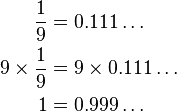Faelco said:
I edited my previous post. That quote and that paragraph are about alternative number systems, here "mathematically coherent ordered algebraic strutures, including various alternatives to the real numbers". Other examples are "mathematical structures with an addition operation but not a substraction operation".
It's not about the "classic" 1-9 and real "usual" numbers. Like it was said in the previous quote, these proves are done with other "artificial" alternative systems not working like the basic one, with other rules and operations.
And I'm not sure this discussion is about non-Archimedean number systems, but more about the "familiar rules of arithmetic".
|
Dude. They're all artificial. In fact, some of the alternate systems were designed to make up for perceived short-comings in the classic system.
I think pointing that out is completely valid.
Regarding the counter-intuitive reaction a lot of people have, that's also valid and understandable. Rather, I think those who mock that reaction in a professional setting are being too narrow minded. The reason it's counter-intuitive is that one number is real while the other is not; claiming that those two numbers are the same does not feel reasonable. It's only after people realize that the "1" they're dealing with inside a system of math is not a real "1" but instead of a representation of "1", thus it can be manipulated by arbitrary rule sets. It's simply a shift of perspective that should be developed rather than expected.




























































